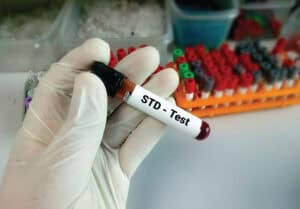
Genital herpes is a commonly found sexually transmitted disease. As many as 1 in 5 people have it, although most don’t know because it often doesn’t cause any noticeable symptoms. Whether or not to get tested, disclose your status, and use protection with new partners are all personal decisions that only you can make after learning everything about genital herpes below.
If you think you might have contracted it or are concerned about a loved one who may have it, it’s important to familiarize yourself with this disease, including its symptoms, treatment options, and ways to protect yourself from contracting it in the future.
Table of Contents
Genital herpes is a sexually transmitted infection (STI) that is spread by the herpes simplex virus. The herpes simplex virus (HSV) has two variants: HSV-1 and HSV-2. Each is equally capable of causing genital herpes, however HSV-2 is the commonly detected variant.
Genital herpes is spread through sexual contact with someone who has the virus. The virus can be passed without symptoms too. A person might not know they have it until it reappears or until they pass it on to their partner. People with genital herpes need to tell their partners about the infection before having sex so they don’t get infected.
Genital herpes causes include the presence of the herpes simplex virus (HSV). The first time someone contracts HSV, they have an outbreak. These outbreaks can recur periodically for people with a weakened immune system or who don’t take precautions to prevent an outbreak. Anyone who has ever had oral sex could contract genital herpes because HSV-1 can also cause it. But those with only one partner are at a lesser risk than those with multiple partners.
Condoms reduce the risk but do not completely eliminate it because condoms do not cover all areas where HSV may be present, such as in your mouth or fingers.
Genital herpes symptoms in men are as follows:
Genital herpes symptoms in women are as follows:
Some people with genital herpes may also experience atypical symptoms such as a fever, headache, and muscle aches.
Genital herpes is diagnosed by taking a swab from the affected area and sending it to a lab for testing. The swab will be examined for the presence of the herpes virus. A positive result indicates that you have genital herpes.
Two types of herpes simplex viruses – HSV-1 and HSV-2 – can cause oral or genital infection. The type detected determines whether the person has cold sores, fever blisters, or genital sores.

If you think you might have genital herpes, it’s important to see a doctor as soon as possible. Early diagnosis and treatment help prevent the virus from spreading and causing more serious health problems.
Your doctor will most likely be able to diagnose you based on your symptoms. They may also do a physical exam and swab your genitals for any signs of infection or disease. The test is easy, takes about 10 minutes, and can tell you if there are active HSV-1 or HSV-2 infections in your body.
No genital herpes cure exists at present but there are treatments that can help manage the symptoms. Antiviral medications can help bring down the number of outbreaks and make them less severe. In some cases, these medications can also help reduce the risk of transmitting the virus to others.
Following are the most common genital herpes treatments:
The most commonly prescribed medication is acyclovir (Zovirax). Studies have shown that Zovirax reduces the duration of a typical episode by about 24 hours when taken at the first sign of a tingling sensation or other signs of impending herpetic eruption.
Taking Zovirax daily may help lower the number of episodes for those who suffer from frequent recurrences.
Other ways to ease the discomfort of genital herpes include using ice packs and taking over-the-counter pain relievers like acetaminophen (Tylenol) or ibuprofen (Advil) during an episode.
Although cold compresses don’t provide any relief from itching, they can help prevent blistering during a herpes breakout by reducing blood flow to the affected area.
Though anyone can get genital herpes virus, some people are more susceptible and at greater risk:
These factors increase your chances of contracting HSV-2 and should be considered when discussing prevention methods.

If you suspect that you might have genital herpes, it’s important to see a doctor immediately. The CK Birla Hospital has a team of experienced doctors who can help you manage your condition and get the treatment you need. Your medical history will be taken, and an examination will be performed.
If an accurate diagnosis is made, you’ll receive information about other types of STD tests that should be conducted. After receiving this information, we recommend that you return for follow-up visits so that your progress can be monitored.
Contact us and book an appointment with Dr Vinod Kumar Khurana.
Ques 1. Is genital herpes curable?
The answer is no. There is no cure for genital herpes, which means that once you’ve contracted it, you must live with it. However, there are many ways in which you can control your condition and make it less of an issue in your day-to-day life.
Ques 2. What triggers herpes genitalis?
HSV causes the herpes virus to appear on the skin or mucous membranes. To contract HSV, a person needs contact with someone who has the disease and contact with fluids from the infected person, such as saliva or semen.
Ques 3. What are the signs of herpes on a woman?
Women may experience sores on their vagina, vulva, cervix or anus; fever; nausea; muscle aches; headache; painful urination and vaginal discharge.
Ques 4. What are the stages of herpes?
HSV infection will either be dormant (no symptoms) or active (symptoms). If the infection becomes active, it will stay that way until treated. It takes about two weeks before there are noticeable symptoms but sometimes even longer. Once a person starts having outbreaks, they should expect one outbreak every 2-6 months if not treated properly.
Ques 5. Can a woman give a man herpes?
Yes, a woman can transmit herpes to her male partner through oral sex or unprotected sex because it’s possible for her to become infected with the virus during childbirth.